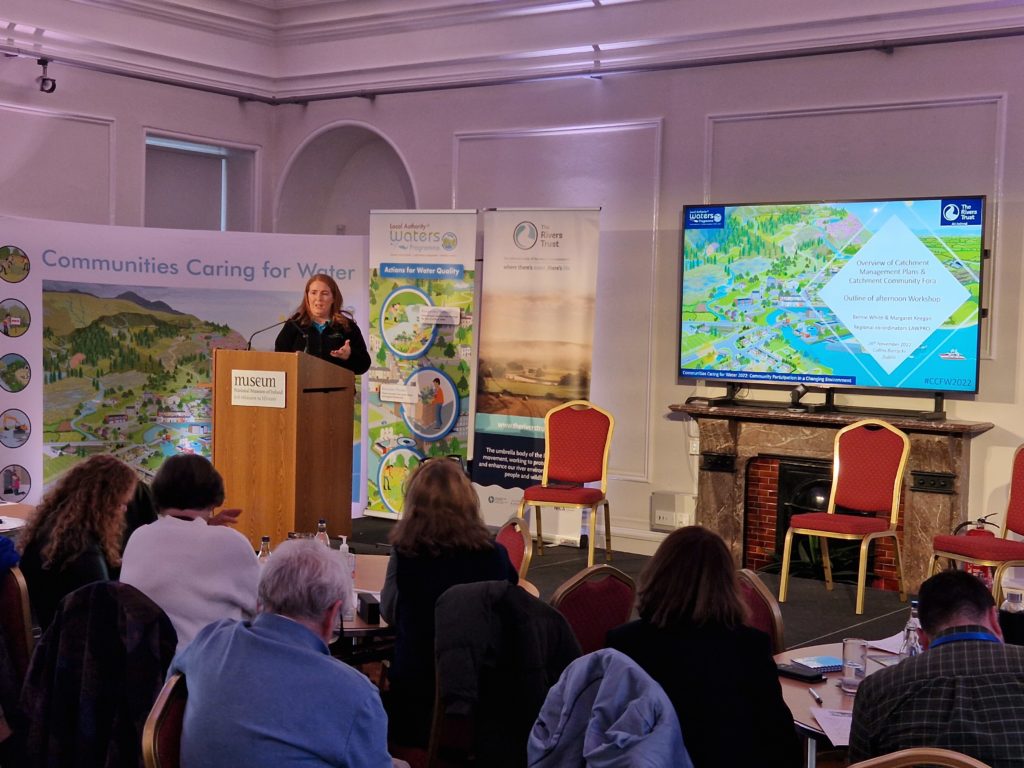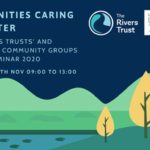The Communities Caring for Water Conference is back and you…
Communities Caring For Water 2022 – conference update
This year’s Communities Caring for Water Conference took place on 26 November at Colins Barracks, Dublin and online. People from communities all around Ireland attended to hear stories and discuss the challenges facing communities who want better water quality in their area. This conference was organised jointly by LAWPRO and The Rivers Trust.
Recent EPA reports highlight the scale of challenges to protect and restore good water quality across Ireland. Against this backdrop, community groups from across the island gathered at the Collins Barracks Museum in Dublin last Saturday for the Communities Caring for Water Conference 2022. The event was also live streamed to an online audience.
The importance of good water services and clean waters to protect public health, support economic growth and preserve our environment for present and future generations cannot be underestimated. However, we have urgent issues to address and a lot further to go if we are to achieve these goals.
Opening address at conference by Malcolm Noonan, T.D., Minister for State for Heritage and Electoral Reform at the Department of Housing, Local Government, and Heritage
The Local Authority Waters Programme (LAWPRO) organised the conference in collaboration with The Rivers Trust as a platform to showcase successful projects and initiatives by energetic and ambitious groups like Cuan Beo from Galway, Ahare River and Biodiversity Development Group from Wexford, and Geashill Tidy Towns from Offaly. The citizen science and river restoration work of community groups, rivers trusts, local development companies, LEADER, and charities like Seal Rescue Ireland were also highlighted.
The positivity in the room was palpable, as commented on by Mark Lloyd, Chief Executive of The Rivers Trust, “everyone in the room had the same passion to find solutions and to work together. Rivers are like a thread that links humanity”.

The stark reality that climate change will lead to increased rainfall, flooding, and sea level rise in Irish catchments was a sobering message from Dr Noel Fitzpatrick of Met Éireann.
The time is right for community groups to get more actively involved in delivering nature-based solutions such as raingardens, swales, and other vegetated overground solutions to manage surface water flows. These solutions can be mainstreamed into engineering projects through meaningful engagement in the planning process, with local communities co-designing or leading on local projects and even assisting with maintenance. These solutions need a multidisciplinary approach bringing together both expert and local knowledge. Lessons learned from other countries show that community involvement in these types of projects, from early design stage through to post construction aftercare, makes for a much better and aesthetic pleasing nature-based solution, delivering benefits for water, biodiversity, climate, and pride of place”
Dr Fran Igoe from the Local Authority Waters Programme
Community Citizen Science
Dr Liam Lysaght, Chief Executive Officer with the National Biodiversity Data Centre explained how Citizen science initiatives can have a powerful role in assisting good policy development and biodiversity action by generating data on our natural environment at a scale and level not possible through state monitoring programmes. This is essential if we are to understand what is happening in our natural environment, including the effects of climate change.
Liz Gabbot from the Maigue Rivers Trust described their citizen science water quality survey on the River Deel in Limerick, which showed that phosphorous pollution is a major problem confirming Environmental Protection Agency monitoring results.
Sara Bourke South Tipperary Development Company outlined a novel eDNA project, which mapped the distribution of rare species in the River Suir by local environmental NGO, Suircan, by just taking water samples and testing for DNA.
Citizen science in the water area requires coordination and therefore adequate resourcing will be needed
Dr Liam Lysaght, Chief Executive Officer with the National Biodiversity Data Centre
Community participation in water management
The conference included a workshop canvasing the views of community groups on the establishment of local catchment fora, to be introduced under the next River Basin Management Plan for Ireland, which will run until the end of 2027. This will place a greater focus on the 46 individual river catchment areas. It is expected that five pilot Catchment Community Fora will be established initially to facilitate greater community participation in decision making on actions for water quality. There is no best practice model for community participation in water management, either in Ireland or across Europe. The views expressed by participants in the workshop were documented to assist with establishing this new model of participation. A common theme on the day was that resourcing for public bodies will be key, together with the relevant sectors delivering on their obligations, combined with community participation in decision making.
I never cease to be amazed by the amount of community-driven activity across Ireland to protect and improve our precious freshwater environment. The conference highlighted this incredible movement and to understand the challenges communities face in meeting local issues head-on. With declining water quality in our rivers and lakes, alarming biodiversity loss, and climate change, rivers trusts, catchment associations and communities caring for water, all need to be properly resourced and supported to buck the ongoing trend in declining water quality. Sustained positive action at a greater scale can deliver benefits for our freshwater environment and society as a whole.
All-Ireland Director of The Rivers Trust, Mark Horton
It was heartening to see the enthusiasm and energy of community groups caring for water.







